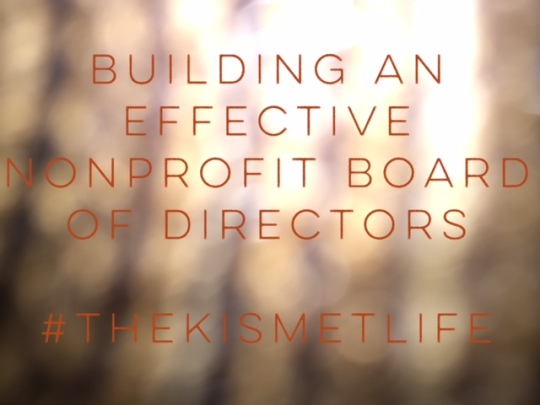The Recipe for Building an Effective Nonprofit Board of Directors
When starting, working with or being part of a nonprofit, there are many “recipes” for how you determine success. You may look at effective programming, strategic planning, fundraising and development but you can’t achieve any of that without one main ingredient and that is making sure that you have an effective nonprofit board of directors.
Board performance is a crucial ingredient to ensuring success within your nonprofit. How can you build a board that is more effective? Let’s first take a look at the role of a nonprofit board of directors. In the simplest sense, a nonprofit board is established to help push the organizations strategic goals, mission and vision forward. Now, how this is done depends on the organization and the goals that you would like to achieve. This is why one of the steps to building an effective board of directors is to,
- Have a succinct organizational mission and vision– Having your mission and vision in place,helps to ensure that those who are on your board support your mission, vision and they are willing to do what is needed to push that forward. You want to make sure that those who are charged with helping to lead your organization support the cause you are working hard to fight for.
- Build based on the needs of the organization- I know that many of us that are “goal-givers” or passionate social entrepreneurs often want to help others in every way that we can, but please make sure that when building an effective board of directors you look for individuals that can help the needs of the organization. Meaning, as much as you may love your Aunt/Uncle/BFF, please do not recruit them to join your nonprofit board because they want to help. If someone does not have the qualifications to meet the needs of the organization in a board capacity, let them volunteer or help in other ways. When building your board, understand that on the onset you may not have the funding for a lawyer or an accountant so start to find individuals that can fill those gaps. Individuals that can help you in the areas that your organization needs the most help in. Look for those who have expertise in the areas of development, finance, community relations, marketing…etc. Believe me, this will be extremely helpful as you start to grow as an organization.
- Recruit from within the board- I serve on numerous boards in which within our succession planning we have to recruit board members that will replace us when our term is over or to join the board in general. We already covered the fact that your board should consist of people that support your mission and vision, so if that is the case-the same people will want to bring the right individuals on board to make sure that the mission continues. Don’t be afraid to discuss this with your Board Chair, the best form of advertising is word of mouth and this also can pertain to recruiting and building an effective board of directors.
- Research! Research! Research! – When you are doing your “vetting” process make sure to research the individuals you’re looking to recruit. Find out what other boards they may serve on or have served on, research what company they work form, find them on LinkedIn. You want to make sure that the individuals chosen align with the brand of the organization. You also want to make sure that there is no conflict of interest, why go through all the trouble just to find out that the individual is not able to serve. Which leads me to number five.
- Connect with board prospects beforehand- This comes down to basic professionalism. After you have done your research, try to connect with that individual on a more personal level. Invite them out to coffee or lunch. This helps you in numerous ways-
- You get to see the person outside of the “computer” learn their personality and see if this is someone that you feel can be a great board member and
- It shows the individual that you care about what they have to offer and see them as a person. I have received invitations to join boards strictly from a static template email but I had no idea about the organization, its mission or who the person was that reaching out. Having that personal touch can go a long way.
- Understand that everyone will not fit- Everyone may not the right person to join the organization, regardless of background, passion, and community contributions. As you are selecting board members, don’t be afraid to say no to individuals that are not a “fit” for your organization. This does not mean that they are not a good person, this just means that they are not right for the direction that the organization and board is moving. You want to make sure that individuals will work well with current board members that they are able to follow thru on the board responsibilities, that they are committed to the strategic plan and goals of the organization. And, if someone does not meet that criteria it’s okay to move on to someone else.
Building an effective board will take a lot of work and effort but once it is done the payoff (not just monetary) will be great and your recipe for organizational success will exude flavor because of it.
How about anyone else, do you have any advice for building an effective board?


